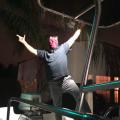Hello All! I'd like to start a discussion! :) One of the on going debates within the fandom is whether or not Aang made the proper decision to *not* kill Ozai. Generally, I've observed these general takes on it: 1. Absolutely the right thing, Aang remained true to his core values.2. Not in the slightest--Ozai was in the process of committing genocide during his battle with Aang and killing him to remove the threat to the world would have been the proper course of action.3. Meh--Aang did remove Ozai's ability to bend and that's "close enough"This has gotten me to thinking--can Aang be properly considered to be acting on his morals--or is it a clear-cut case of adhering to the morals he was taught by the monks without having ever questioned them, as a child does. Psychologically questioning beliefs and exploring ideas tends to begin in the teen years. Aang was at most 13ish at the time of the fight and hadn't yet embarked on that journey. In fact, I would make the argument Aang evolved the least during the story. His source of wisdom was via the monks--he was quite rigid in his belief that that was the only wisdom there was. He hadn't learned, as Uncle Iroh would put it, to "take wisdom from many sources." Aang had managed to learn some of the basics of other elemental bending--but I don't think it can be claimed that he learned from the wisdom of other cultures either. This makes the fate of Ozai all but assured, and accounts for why it was absolutely necessary for the Lion Turtle to have intervened and given Aang an "out". But what do you think? What are your theories?
Dimension:
1200 x 675
File Size:
52.38 Kb

Like (2)
Loading...

Stevie stevie 123
You lost me @ Aang







1
 1
1
 1
1
Emzy InfirmusEI
Emzy Infirmus
For me, the lion turtle felt like a deus ex machina that absolved Aang of his moral decisions. I think that exploring the complex consequences would have added layers to an already nuanced depiction of war. It was a missed opportunity







1
 1
1
 1
1